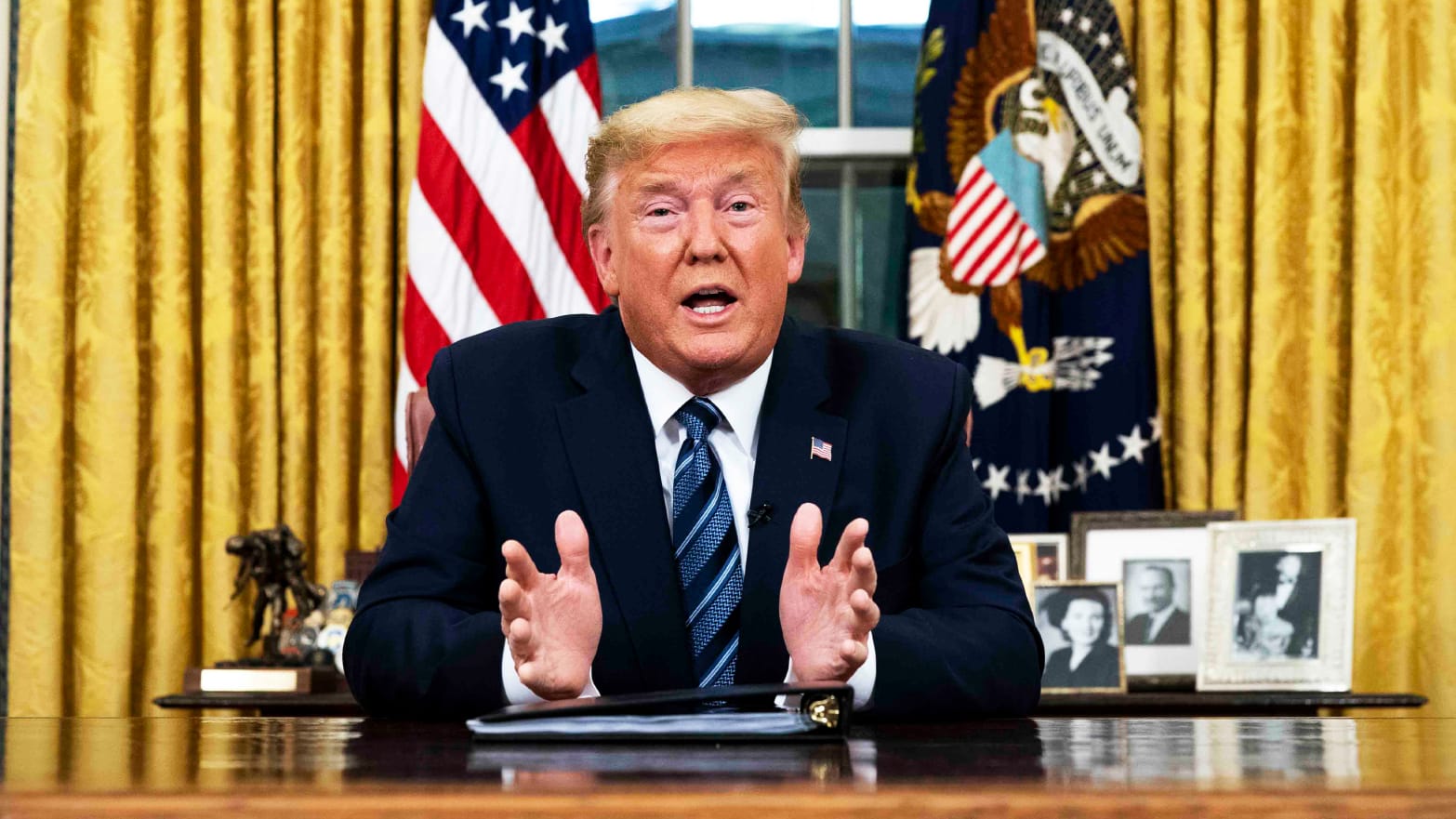President Donald Trump’s Oval Office address Wednesday evening was supposed to calm concerns about the spread of the coronavirus. Instead, it sparked panic and confusion. Not just among the markets, U.S. travelers, and international leaders but within his own administration as well.
Two officials in the U.S. State Department told The Daily Beast that foreign service officers and diplomats were unprepared for the president’s announcement and spent the early hours of Thursday scrambling to figure out how their work and travel would be affected in the short term.
“It is just total chaos,” said one official currently abroad, adding that they did not know if they would have to return to the U.S. immediately or if they would need to quarantine for two weeks upon arriving. Diplomats and other U.S. staff overseas did not know if they’d be able to even visit their families back in the States, and they frantically searched for answers that weren’t immediately available from Foggy Bottom or the West Wing.
In his Oval Office address Wednesday night, President Trump announced that he was banning travel from Europe to the U.S. but did not specify the details of how that plan would be rolled out or if Americans could still travel to the region. He also did not give European officials a heads up, saying the situation required him to move with haste.
The result was confusion. Another U.S. official said they received calls from their European counterparts asking for clarification on exactly what the president was restricting in regard to travel to and from European countries. As of Thursday night, U.S. officials abroad said they were still unclear exactly how Trump’s proclamation would be implemented in real-time. Secretary of State Mike Pompeo had not updated embassies with any guidance or notes on preventive measures.
“I’m used to it with this administration that we wouldn’t know anything until the morning after,” another U.S. official said. “But now basically a full work day later? That’s surprising even for these times.”
That lack of clarity extended to within the walls of the White House. Shortly after President Trump's speech on Wednesday, White House aides and administration officials were already scrambling to walk back, clarify, or straight-up correct key portions of his high-stakes Oval Office address, furiously communicating with one another and inquisitive media outlets trying to figure out what had just happened.
During Wednesday’s address, the president asserted that new travel restrictions would “apply to the tremendous amount of trade and cargo,” a claim administration officials almost immediately clarified would not apply to individuals or trade outright. Trump also mentioned that health insurance companies had “agreed to waive all copayments for coronavirus treatments,” a claim that was news to befuddled health insurers. And Trump’s travel ban was widely interpreted as applying wholesale to continental Europe, only to have White House communicators clear up that the intended policy exempted several countries beyond the UK.
“We are wasting time playing mop-up on something we absolutely should not have to do right now,” said a senior Trump administration official working on the communications clean-up since Wednesday evening. “And it goes without say[ing] that we aren’t allowed to admit that any of it is the fault of the president.”
The corrective blitz went late into the night and then continued well into Thursday, as senior officials held several closed-door meetings into the early afternoon gaming out how to finish cleaning up for the misinformation and inaccurate assertions that President Trump made in his prepared remarks, which were largely co-authored by the White House’s immigration policy adviser Stephen Miller and the president’s son-in-law, Jared Kushner.
Seven Trump administration officials described to The Daily Beast a mad dash to contain fallout from Trump’s delivery that could further spook the markets or stir panic in Americans, at home and abroad, and international trade partners and allied nations.
The chaos only added to the frustrations that the upper ranks of the Trump administration have felt this week as top officials have scrambled to control the fallout of a growing pandemic. And it’s been complicated by the fact that part of their efforts have been devoted to making sure that Trump himself doesn’t feel under siege.
In the midst of this maelstrom, administration officials and top Republicans have gone out of their way to insist that the president has been doing an unimpeachable job at managing the crisis, mainstream media and Democratic politicos be damned.
“President @realDonaldTrump has taken bold action in response to the #Coronavirus. The steps the President announced in regard to Europe protect the American people—our highest priority—and are part of the most comprehensive effort to confront a virus in modern history,” Secretary of State Mike Pompeo gushed on Twitter Thursday.
On Wednesday, Secretary of Education Betsy DeVos tweeted, “From day one, @realDonaldTrumphas taken an aggressive, unprecedented approach to combating coronavirus. His decisive actions, including the additional steps announced tonight, will help prevent the spread of this virus and keep more students, parents and communities safe.”
HHS Secretary Alex Azar released a statement lauding Trump's “bold new steps,” while blasting those who've “criticized the President's decisive steps early on in this outbreak.” Secretary of Commerce Wilbur Ross similarly rushed to applaud the president's “unprecedented whole-of-government approach.”
The marshaling of the federal government’s communications resources to provide a near-constant stream of statements, social-media posts, and press releases coddling the president’s ego was treated internally as business as usual inside the administration. But for veterans of past White Houses, it was both remarkable and dispiriting.
“[President Barack] Obama would never have allowed us to host a North Korea-style press conference where he was lavished with praise [in a public-health crisis]. He wanted his team to regularly release factual, science-based information, even when it was bad news,” said Tommy Vietor, who served as a White House spokesman during the 2009 swine-flu crisis, a pandemic that Trump, as well as various Republican figures and conservative-media stars, have frequently cited as a "whatabout" in defending the current administration’s response.
“We were never told to put out information about how great Obama’s response effort was,” Vietor added. “His focus was on managing the actual problem, and if we were able to do that, public opinion about the response would follow.”


